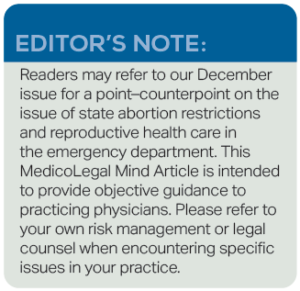Navigating Strict State Abortion Laws - ACEP Now (original) (raw)
On June 24, 2022, Roe v. Wade was overturned by the U.S. Supreme Court, leaving regulation of abortion to the discretion of the states. Since then, many states have enacted laws to strictly regulate abortion, resulting in complex legal considerations for medical professionals.1,2 This article reviews key statutes in the states with the strongest prohibitions against abortion and offers documentation principles for treating patients with ectopic pregnancies, spontaneous miscarriages, and other pregnancy-related emergencies.
Summary
New state laws aim to reduce elective abortions and exempt treatment of ectopic pregnancies, spontaneous miscarriages, fetal demise, and fetal nonviability from prosecution. They do not, or should not, affect care in the emergency department. Current literature suggests criminal and civil actions against emergency clinicians under these strict laws remains low.3,4 However, there have been multiple lawsuits claiming that emergency care was not given because of these new laws or misunderstandings of the laws by clinicians.3,4 Thus, legal problems are more likely to arise from not providing routine emergency care than from altering the standard of care out of fear of prosecution.5
Note
Contraception, implantation prevention (“morning after”), RU-486, and other medications intended to end an otherwise viable pregnancy (which poses no threat to the pregnant woman’s health) are beyond the scope of this article. Treatment of ectopic pregnancy with medications or surgery is within the scope of this article, as are standard medical and surgical treatments for spontaneous abortion, septic abortion, and any related conditions that threaten the mother’s life and health.
General Principles
In the care of any acute pregnancy-related emergency, provide usual, appropriate care.
Document specific legal exemptions in cases of ectopic pregnancy, spontaneous miscarriage (full or incomplete), nonviable fetus, or fetal demise.
In cases where treatment may likely or possibly result in the loss of a potentially viable fetus, document an understanding of the risk and that the risk to the mother’s life, health, or bodily function outweighed the risk to the fetus.
RELEVANT STATE STATUTES, EXEMPTIONS, AND DOCUMENTATION SUGGESTIONS
Alabama
Statute: Alabama Code § 26-23H-1, et seq.
Exemptions: Ectopic pregnancy, lethal anomaly, the child would not survive birth, would die shortly after, be stillborn, or a medical emergency where the condition presents serious health risk to the pregnant woman, such as severe bleeding or sepsis.
Suggestions: This suggests that ectopic pregnancies and life-threatening miscarriages are exempt. A second physician’s sign-off is required within 180 days for treatment of incomplete miscarriages threatening the mother’s life or body organ dysfunction.
Arkansas
Statute: A.C.A. § 5-61-301, et seq.
Exemptions: Only instances to save the life of the pregnant woman. Excludes procedures aimed at removing a deceased fetus from spontaneous abortion or treating ectopic pregnancies.
Suggestions: Document ectopic pregnancy, spontaneous miscarriage with a significant threat to the mother’s life. Conditions endangering the mother’s life or causing severe health risks may also qualify for exceptions.
Idaho
Statute: I.C. § 18-501 et seq.
Exemptions: Substantial risk for death or serious risk for an irreversible impairment of a bodily function to the pregnant woman (not including psychological or emotional conditions).
Suggestions: Document the threat to the mother’s life or bodily function.
Indiana
Statute: Ind. Code § 16-34-2-1
Exemptions: Treatment necessary to prevent death or serious health risk to the pregnant woman. Broad license to treat medical emergencies that threaten the mother’s life or bodily function.
Suggestions: Document and certify regarding the serious health risk to the mother’s life or bodily function posed by the disease. For ectopic pregnancy, mention the threat to life/health and evidence supporting that medical treatment may prevent surgery and enhance future fertility.
Kentucky
Statute: KRS § 311.772
Exemptions: Treatment necessary to prevent death, substantial risk for death, or serious impairment of a life-sustaining organ of the pregnant woman.
Suggestions: Document the threat to the mother’s life or bodily function. For ectopic pregnancy, mention the life/health threat and evidence supporting that medical treatment may prevent surgery and enhance future fertility.
Louisiana
Statute: La. R.S. § 40:1061, et seq.
Exemptions: Treatment necessary to prevent death, substantial risk for death, or serious impairment of a life-sustaining organ of the pregnant woman.
Suggestions: Document the threat to the mother’s life or bodily function. For ectopic pregnancy, note the life/health threat and evidence supporting that medical treatment may prevent surgery and enhance future fertility.
Mississippi
Statute: Miss. Code Ann.§ 41-41-31, et seq.
Exemptions: Treatment to remove a deceased fetus. Treatment necessary to preserve the pregnant person’s life or prevent serious impairment of a life-sustaining organ, where waiting 24 hours would create grave peril of immediate and irreversible loss of major bodily function.
Suggestions: Document fetal death or the life/health threat. For ectopic pregnancy, mention the life/health threat and evidence supporting that medical treatment may prevent surgery and enhance future fertility.
Oklahoma
Statute: 63 Okla. St. § 1-745.5
Exemptions: Conditions where it is necessary to avoid serious risk for death or a serious risk of a life-threatening physical impairment of a major body function (not including psychological or emotional conditions). Excludes procedures aimed at live birth, treating ectopic pregnancies, or removing a deceased fetus.
Suggestions: Document treatment for ectopic pregnancy as exempt. For spontaneous abortion cases like sepsis or severe bleeding, document health or reproductive risks.
South Dakota
Statute: S.D. Codified Laws § 22-17-5.1, et seq.
Exemptions: Treatment necessary to preserve the pregnant person’s life.
Suggestions: Document the life threat. For ectopic pregnancy, mention the life threat and evidence supporting that medical treatment may prevent surgery and enhance future fertility.
Tennessee
Statute: Tenn. Code Ann. § 39-15-213, et seq.
Exemptions: Ectopic pregnancy, molar pregnancy, deceased fetus, and substantial risk for death or serious risk of an irreversible impairment of a bodily function to the pregnant person.
Suggestions: Document that ectopic pregnancy treatment is exempt. For spontaneous miscarriage posing health risks, document the life/health threat and when continuation is more likely to harm the pregnant person.
Texas
Statute: Tex. Health and Safety Code § 170A.001, et seq.; § 245.002
Exemptions: Excludes procedures for removing a deceased fetus caused by spontaneous abortion, ectopic pregnancies, and life-threatening physical condition or serious risk for an irreversible impairment of a bodily function to the pregnant person.
Suggestions: Document ectopic pregnancies and nonviable miscarriages as exempt, explicitly noting any life/reproductive health threats.
West Virginia
Statute: W. VA Code § 16-2R-1, et seq.
Exemptions: Nonviable embryo/fetus, ectopic pregnancy, or medical emergencies where it is necessary to avoid serious risk for death or a serious risk for a life-threatening physical impairment of a major body function (not including psychological or emotional conditions).
Suggestions: Document fetal nonviability, ectopic pregnancy, or the need for emergency treatment potentially ending the pregnancy.
 Dr. Bedolla is assistant professor at the University of Texas Dell Medical School and national director of risk science at US Acute Care Solutions.
Dr. Bedolla is assistant professor at the University of Texas Dell Medical School and national director of risk science at US Acute Care Solutions.
References
- Davis MF. The state of abortion rights in the US. Int J Gynaecol Obstet. 2022;159(1):324-329.
- Gostin LO, Wetter S, Reingold RB. One year after Dobbs-Vast changes to the abortion legal landscape. JAMA Health Forum. 2023;4(8):e233091.
- Manninen BA. A critical analysis of Dobbs v. Jackson Women’s Health Organization and the consequences of fetal personhood. Camb Q Healthc Ethics. 2023;32(3):357-367.
- Fox D. The abortion double bind. Am J Public Health. 2023;113(10):1068-1073.
- Lilly AG, Newman IP, Bjork-James S. Our hands are tied: abortion bans and hesitant medicine. Soc Sci Med. 2024;350:116912.